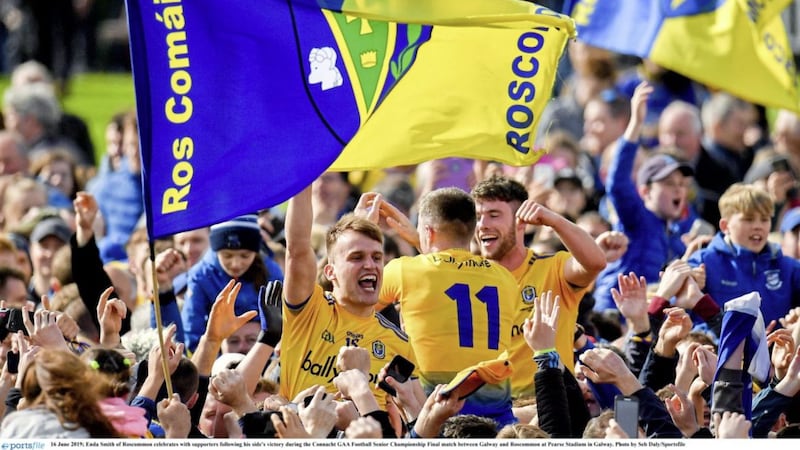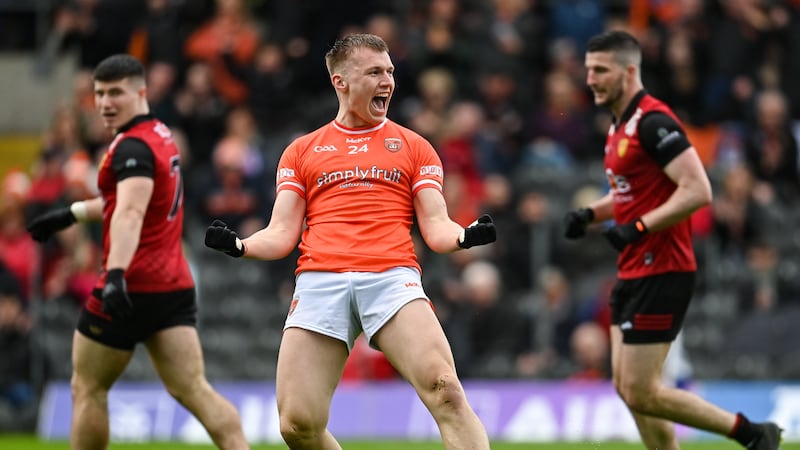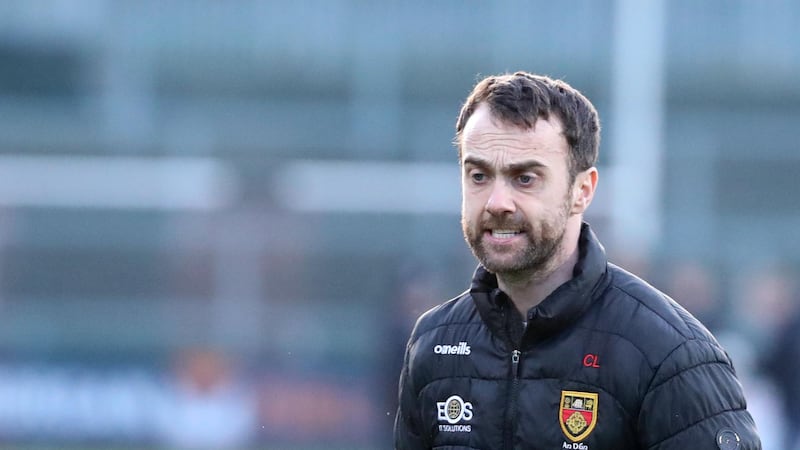AS the sun called briefly into wintry Salthill for a flying visit, like the aunt you see once every five years, the Roscommon people couldn’t hold their water waiting on Barry Cassidy’s whistle.
In their giddiness, hundreds spilled out on to the battlefield to salute their heroes before the white flag had been lifted.
The referee’s clubmate Kevin ‘Mal’ O’Neill tweeted on Sunday evening: “Just reminds me of when Barry used to help shoo Tommy McCann’s cattle down the Culbane Road for milking!!”
It was a second provincial title in three years for the Rossies, both won in Salthill at Galway’s expense. Their joyous celebrations after the game were like a scene from the 1980s, akin to those of a far more ravenous county.
Contrast that with how Dublin’s players greet a Leinster title now, as though they’re after bumping into the ex-wife. A half-embarrassed smile and keep on down the road. Kerry are the same in Munster.
Those two undermine the entire provincial structure because their winning has become joyless. Victory this weekend means nothing to them beyond laying their towel out on a bed for the Super 8s.
Dublin have lost one of their last 44 games in Leinster. Kerry have lost once in Munster this decade. How could the celebrations be anything other than lifeless?
Mickey Harte once bemoaned the same complacency that befell Tyrone supporters when they won Ulster in 2010. The customary Clones invasion ceased to be of interest. To them, provincial titles were only a subsidiary of the prize that they now felt they had a right to covet annually.
Twelve months later, it seemed the whole of county Donegal was trying to heave the Gerry Arthurs Stand into the car park just to get touching the Anglo Celt. 19 years had been a long time for them to wait.
Imagine were Cavan to win it on Sunday. Even if ‘plan B’ to keep them off involved the deployment of enough wild horses to have one for every man, woman and child, their supporters still wouldn’t be kept from bounding their way down on the pitch if the result goes their way.
For every Kerry and Dublin, there are far more Cavans and Monaghans and Meaths and Corks, who cherish even the notion that silverware might flutter its eyelashes at them.
Thus the no way to truly take stock of what a provincial title now represents. It cannot be generalised. What winning means to one is completely different from what it means to the other.
Ulster football this year has produced its share of excellent games. Connacht has offered the same drama that it has for the last four summers, ever since the book closed on Mayo’s brief monopoly closed.
The formats of the Munster and Leinster hurling championships may be different but that makes them no less. Saturday evening’s four-team scrap for mere survival was as gripping as any sporting drama you’ll find.
The reformation of those competitions could have been a disaster had they not followed one very important, but simple, premise.
The round robins are not just about giving teams and fans more games. We’ve already lost the two All-Ireland finalists from 2017 for this year, and fulfils the most important criteria of all: It has to mean something.
Last weekend, the GAA confirmed the members of a body that will be given licence to look at the fixtures mess, and within that the structure of the competitions.
Top of that agenda will be the All-Ireland SFC, and by consequence the provincial championships. John Horan is determined to press on with a tiered championship from 2020.
It’s often said that the provincials should be played as a fore-runner to the summer’s big business, divorced from the All-Ireland series itself.
That seems the most likely option in a tiered structure. But all it does is push them into a shallow grave. Those games instantly become glorified challenge matches.
Would Barry Cassidy have to herd the Roscommon fans off the pitch in 10 years’ time if they were playing against Galway and Mayo sides that were experimenting with their teams ahead of the real championship? Not a chance.
But while it may not feel like it sometimes, hurling still shows the way with its five tiers.
They are not bound by the geographical borders of old, and they’re far better for it.
Football seems determined to go for a two-tier structure when it needs at least three. No-one outside the top five will win the ‘A’ competition, leaving eleven teams just bobbing along.
Look at those 11. Monaghan, Roscommon, Cavan, Meath, Donegal, Fermanagh, Kildare, Armagh, Clare, Westmeath and Laois. To almost all, a provincial title would mean a hell of a lot.
Yet if you stick them into a 16-team All-Ireland and in doing so, you remove the lustre of the provinces by either diluting or deleting them, then what is left for those counties?
On the ‘B’ side of the proposed structure, the Division Four sides would stand a slightly better chance of bridging their gap to the top end of Division Three.
But then take the likes of Down and Cork, who’ll be stranded there if it is brought in next year.
Would they celebrate wildly at beating Louth or Longford or Offaly in the final? Or in their own way, would they view it exactly as Dublin and Kerry view things now, as merely a gate into the next field?
You’d be hard pressed to argue that it wouldn’t be the latter.
And that’s the worry about these tiers. That if it’s simply split down the middle, more than half the counties either won’t be able to win in the top tier, or won’t care about the winning in the bottom one.
There’s a good reason why the senior, intermediate and junior grades at club level have always been so successful. The gulfs become mere gaps, and with that comes opportunity and excitement.
For a tiered structure to flourish, there has to be balance. The provincial championships should stay, but not as they are. They have to be redrawn into four eights – put Cavan and Longford in Connacht, and Wexford and Carlow in Munster – and remain linked to the All-Ireland series, regardless of what format it takes.
Because winning has to mean something. It has to mean everything.
Otherwise it’s all nothing.








